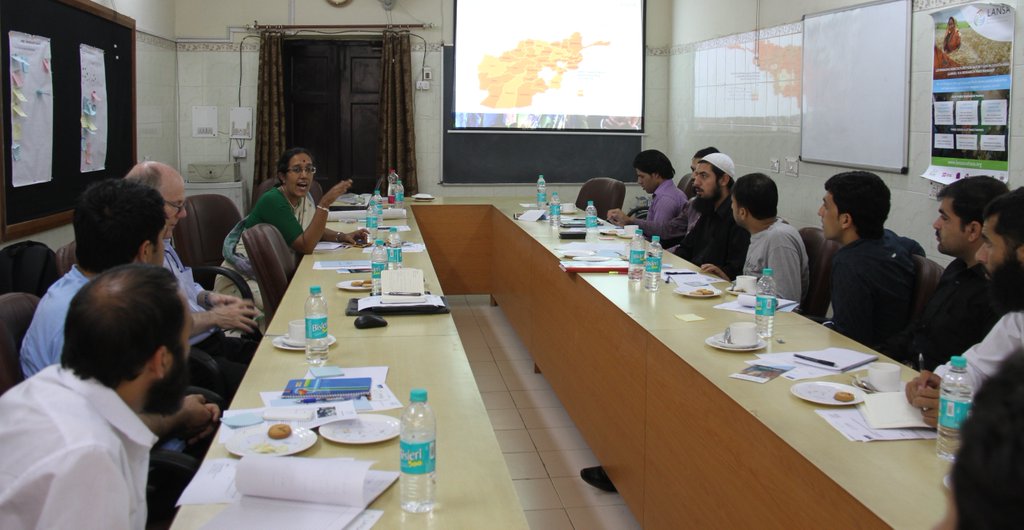
On April 19, LANSA partners - MSSRF and LCIRAH organsied a research uptake cum capacity strengthening workshop in New Delhi for agriculture scientists from the Afghanistan National Agriculture Science and Technology University (ANASTU), Kandahar. The day-long workshop was facilitated and hosted by the Indian Agricultural Research Institute (IARI), New Delhi, India.
The LANSA workshop was aimed at shaping understanding of nutrition while looking to stimulate and sensitise the agriculture scientists to consider how agriculture can help address the problem of undernutrition in Afghanistan. These scientists were at IARI for trainings involving specialised courses as part of the Government of India's initiative to develop capacity of students and faculty at ANASTU.
'Can agriculture help tackle undernutrition in Afghanistan?' was the topic for the day, and the 11 participants were presented with LANSA research findings to encourage awareness and discussion around the topic. Nigel Poole, LANSA’s research lead for Afghanistan gave an overall view of the agriculture and nutrition scenario in the country based on analysis from National Risk and Vulnerability Assessment (NRVA) 2011-2012, and also from the National Nutrition Survey (UNICEF/NNS) 2014 data. During the workshop, the transcribed findings of LANSA-led interviews were shared with the ANASTU scientists to seek their opinion and feedback.
LANSA had begun work in Afghanistan in 2015 with mapping agriculture and nutrition stakeholders, also looking into policy mapping. Fifty key stakeholders from public sector organisations, donor agencies, NGOs and academics from Kabul and four provinces were interviewed.
R V Bhavani, LANSA’s Programme Manager, presented an overview of LANSA work in South Asia, and the participants also got to hear about the Farming System for Nutrition feasibility study being undertaken by MSSRF in India as a likely model to address the problem of undernutrition.
PRE AND POST SURVEY ANALYSIS
The workshop began with the participants taking part in a Pre-Workshop Survey tool to find out their overall expectations and understanding of the agriculture-nutrition subject. An Exit Survey at the end of the workshop was also arranged as a feedback-cum-assessment tool. Both surveys organised by Sangeetha Rajeesh, LANSA’s Research Uptake Manager, were to explore how LANSA can support the ANASTU agriculture scientists in linking nutrition to their work at the University in Afghanistan.
In the pre survey, participants were asked about their overall expectation of the workshop. Nine out of the 11 felt that there is need for a programme like LANSA to help strengthen agriculture systems, especially in Afghanistan. They expressed interest in understand the LANSA objectives as well as the future plans for Afghanistan.
To the question on whether they thought agriculture can tackle undernutrition in Afghanistan – seven said “YES" and the rest preferred “MAYBE." With none answering in the negative, LANSA looked at it as a positive sign to discuss how agricultural systems could be better leveraged to address undernutrition in the country. Many participants actually looked beyond to answer why they think enhancing farming systems can bring about sustainable practices and tackle undernutrition.
Overall feedback at the end of the one-day workshop got participants admitting that their expectations were met, and that a long term ANASTU tie up with LANSA would guide their knowledge and motivate them to be innovative toward modern agriculture for nutrition. The respondents agreed that Afghanistan is agriculture-dependent and research on nutrition-sensitive agriculture as well kitchen garden intervention ideas from LANSA will help to support ANASTU establish the need for agriculture to impact nutrition. There was also suggestions to be connected to courses and other such workshops facilitated by LANSA in the region.
Surveys can be viewed here.
